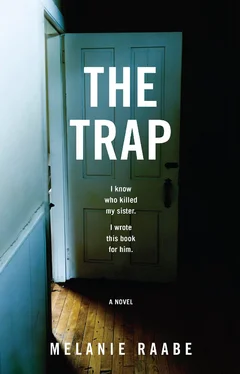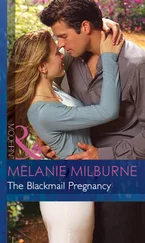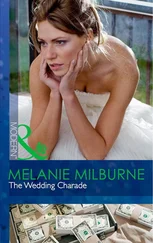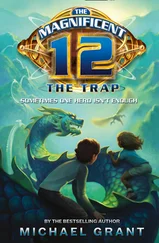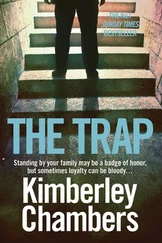For a moment only the soft noise of the dishwasher could be heard in the kitchen.
“I can’t sit around doing nothing,” Sophie said at length. “And I haven’t done anything wrong. You can’t ban me from talking to people.”
She turned away from him and glared out of the window.
“There are charges against you,” Jonas said.
“What?”
Sophie spun around and looked at him with big eyes.
“I don’t handle those kind of offenses. I found out about it by chance,” Jonas said. “But my colleagues are bound to be in touch with you before long. There’s a man claiming you pursued him and physically attacked him. Is that true?”
“Physically attacked…Sounds a bit extreme,” said Sophie. “I held on to his arm, that was all. The bloke was a good head and a half taller than me — how could I have seriously attacked him?”
“Why did you hold on to him?” Jonas asked, although he already knew the answer.
Sophie said nothing. She stared out of the window in silence.
“You thought you’d recognized the man you saw that night,” Jonas said.
Sophie nodded.
Jonas thought of what Antonia Bug had said. “ That woman’s not quite right in the head. Who knows if she saw anyone at all?”
He tried to drive the thought away.
“I saw him,” Sophie blurted out, as if she could read his mind. “As clearly as I see you now.”
Jonas swallowed.
“You do believe me?”
She turned around with a jerk, knocking the empty coffee cup off the windowsill with her elbow. The china smashed on the floor.
“Shit!” said Sophie.
Jonas and Sophie crouched down to pick up the pieces at the same time and banged heads. Embarrassed, they rubbed their foreheads and had to laugh. After they’d gathered it all up, they stood facing one another.
It seemed to Jonas that it was considerably warmer in the room than before. Sophie was one of those rare people who could stand there, looking at you in silence, without making you feel awkward. How on earth did she do it?
The doorbell rang and the moment ended. Sophie ran her hand through her hair.
“That’ll be my friend Karen — we were going jogging.”
“I must be getting on, anyway.”
Sophie nodded. Jonas turned to leave, but stopped in the doorway.
“I do believe you,” he said.
Then he left the flat, his heart pounding.
The thought that Lenzen might hurt Charlotte in some way sends a surge of nausea through my body. His threat is probably an empty one, but I can’t stop thinking about it. I can tell by looking at Victor Lenzen that he’s having trouble hiding his smug smile. Here he is at last: the monster from my dreams.
The rain outside has grown heavier; through the window I can see bullets of water riddling the surface of the lake. People in the real world will be grumbling about it. The more prudent among them will be going about under wind-bent umbrellas like oversized walking mushrooms. The rest will be dashing from shelter to shelter like scared animals, while the rain drenches their scalps.
“Do you like animals?” I ask Lenzen, even before he’s sat down again. Carry on. Keep things moving.
“I’m sorry?”
He sits down.
“It’s my turn. Before we were interrupted, you asked me what my dog was called and I said, ‘Bukowski.’ Now I’m asking whether you like animals.”
“Oh, we’re still playing this little game, are we?” I don’t respond.
“You’re an eccentric woman, Frau Conrads,” says Lenzen. I don’t respond.
“All right then,” he says. “Not especially. I never had a pet or anything, if that’s what you mean.”
He glances at his notes, then looks me in the eye again.
“I don’t like the tone our conversation is beginning to take,” he says. “I’m sorry if I provoked you.”
I don’t know what to say to this, so I nod.
“Let’s get back to your writing. What do you like most about your work?”
“Creating my own realities. And, of course, providing my readers with something that gives them pleasure,” I say, with perfect sincerity. “What about you? What do you like most about your work?”
“Interviews,” says Lenzen, and grins. He looks at his papers again. “Although — or maybe because you never appear in public — there’s a lot about you in the press and on the Internet.”
“Oh yes?”
“Do you read articles about yourself?”
“Sometimes, when I’m plagued by boredom. Most of it is pure fiction.”
“Does it upset you to read things about yourself that aren’t true?”
“No, it amuses me. The more off the wall, the better.” That, too, is true.
“My turn,” I say. “Two turns.” I consider for a moment.
“Do you think you’re a good person?” I ask.
I’m fishing in troubled waters. Up until now, all my questions have slid off him. I don’t know what I’m angling for. I had wanted to proceed in a structured fashion — find out what he looks like when he’s telling the truth, then what he looks like when he’s lying. And, finally, tighten the screws. But Lenzen is as slippery as an eel. Maybe I should try to provoke him.
“A good person?” he echoes. “My God, you don’t half ask some questions. No, probably not. But I make an effort every day.”
Interesting answer. Lenzen is silent, as if probing his words before eventually approving them. Keep firing.
“What do you regret most in your life?”
“I don’t know.”
“Then think about it.” Lenzen pretends to ponder.
“The things that led to the breakup of my marriage, I suppose. What about you? What do you regret?”
“That I wasn’t able to save my sister,” I say. It’s true.
“Your sister’s dead?” Lenzen asks. Bastard.
“Let’s drop this,” I say.
He frowns, seems momentarily bewildered, but soon recovers his composure.
“Where was I? Ah, yes. You say that the stories about you that are circulating on the Internet don’t bother you. Does criticism bother you?”
“Only when it’s justified,” I say. Quick, keep going. “What do you most regret not having done?”
He’s back on track and replies immediately.
“I should have been there for my daughter more when she was little,” he says, then presses right on. “A critic once wrote that your characters are strong, but that your plots lack verve.”
“What’s your question?” I ask.
“I’m still formulating it. What bothers me much more than the plot, you see, are some of the characters in your latest book. There are two characters in your novel who are less vivid to me than the others, and they are, interestingly enough, the murder victim and the murderer. The murder victim is — forgive me if I exaggerate — a kind, naive country bumpkin, while the murderer is a soulless sociopath who likes killing young women. Why did you draw such archetypal figures when you’re so famous for your finely drawn characters?”
Every hair on my neck is standing on end.
“That’s easy,” I say. “I don’t regard those characters as clichéd archetypes.”
“Don’t you?” says Lenzen. “Take the murdered woman, for instance — Britta, as she’s called in the book.”
My scalp contracts. As she’s called in the book. He’s practically admitting he knows that she really existed and that she had a different name in real life.
“Do you consider the character of Britta realistic?” asks Lenzen.
“Absolutely.”
Of course I do. Britta is Anna, Anna is Britta. She exists, she existed. I knew her as well as I know myself.
“Isn’t Britta more an idealized portrait of a young woman? A lily-white dream. Sickly sweet, clever, kind, and oh so virtuous. I mean, that scene where she reacts to the homeless man as a little girl, wanting to fetch all the homeless off the streets…”
Читать дальше
